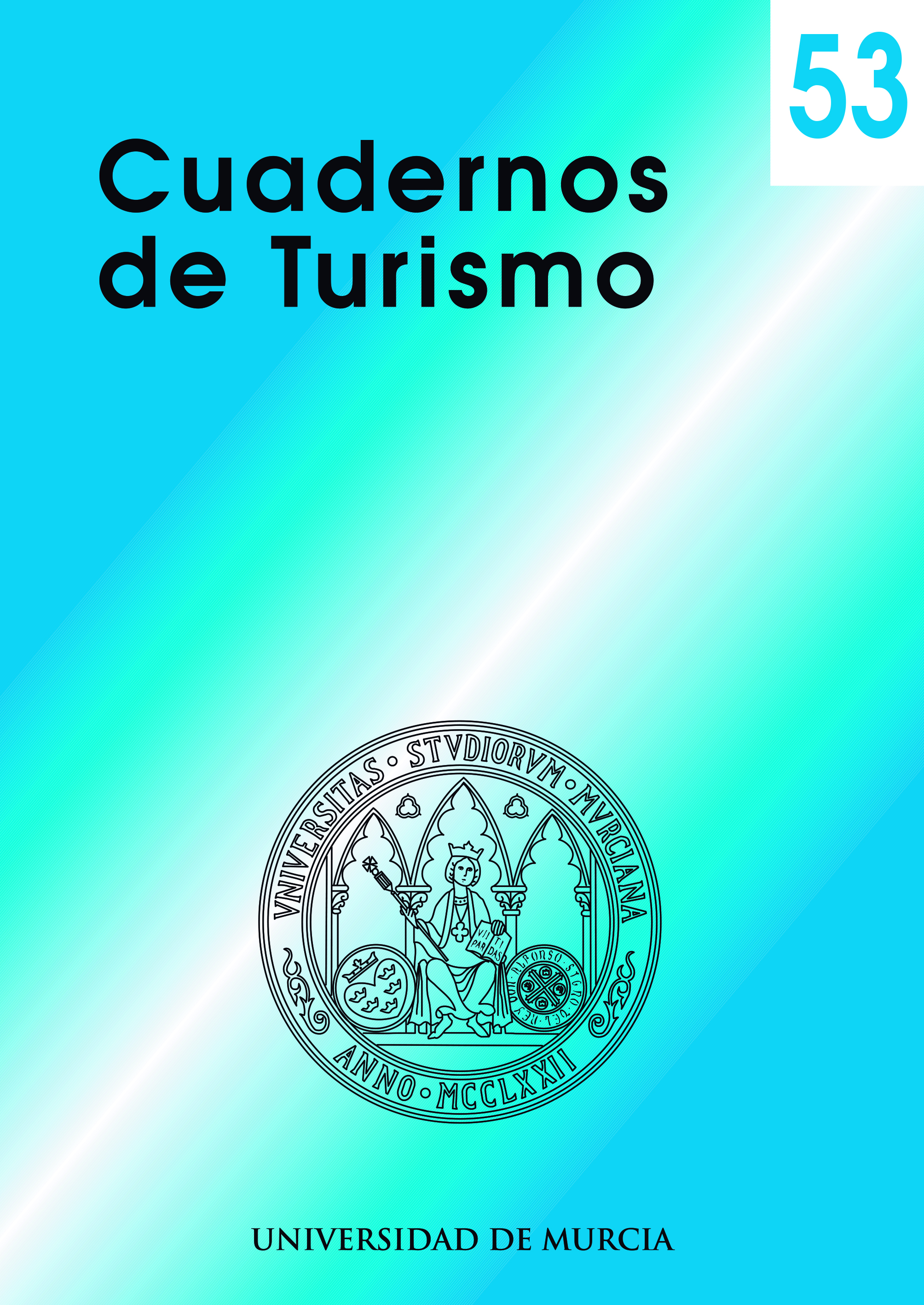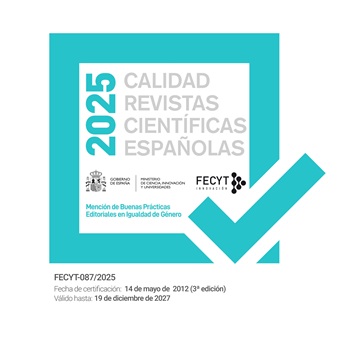ASSESSING THE ADAPTATION OF TOURISM COMPETITIVENESS IN TEN SPANISH DESTINATIONS: A MULTICRITERIA PROPOSAL
Abstract
Tourism competitiveness represents an essential topic in an overexploited market, considering the vulnerability to socioeconomic situation and to environmental and technological advances challenges. Using multi-criteria techniques, this article evaluates the competitiveness of Spanish urban destinations in two scenarios related to the recent pandemic, by means of a synthetic index formed by more than ten pillars and more than thirty criteria. The resulting rankings highlight factors that have influenced their capacity to adapt.
Downloads
-
Abstract435
-
PDF (Español (España))528
-
PDF528
References
ARÉVALO-QUIJADA, M.T., CASTRO-NUÑO, M., YÑIGUEZ-OVANDO, R. (2009): «Evaluación multicriterio de la capacidad inversora de las Comunidad Autónomas bajo el principio de estabilidad presupuestaria», en Congreso Internacional Cooperación transfronteriza Andalucía-Algarve-Alentejo, pp. 5-24. https://hdl.handle.net/11441/92327.
ASSAF, A. y SCUDERI, R. (2020): «COVID-19 and the recovery of the tourism industry”, Tourism Economics, vol. 26 (5), pp. 731-733. https://doi.org/10.1177/1354816620933712.
ATTILA, A.T. (2016): «The Impact of the Hotel Industry on the Competitiveness of Tourism Destinations in Hungary”, Journal of Competitiveness, vol. 8 (4), pp. 85-104. https://doi.org/10.7441/joc.2016.04.06.
BENITO, S.R. (2020): «Vista de la economía española y el COVID-19: ¿hacia una “nueva” normalidad?» Journal of Economic Literature, vol.17 (51), pp.101-125. http://revistaeconomia.unam.mx/index.php/ecu/article/view/550/583.
BLANCAS-PERAL, F.J., GUERRERO-CASAS, F.M. y LOZANO-OYOLA, M. (2009): «La localización espacial en la planificación del turismo rural en Andalucía: Un enfoque multicriterio”, Revista de Estudios Regionales, nº 84, pp. 83-113. http://www.redalyc.org/articulo.oa?id=75511780003.
BOIVIN, M. y TANGUAY, G.A. (2019): «Analysis of the determinants of urban tourism attractiveness: The case of Québec City and Bordeaux”, Journal of Destination Marketing & Management, vol. 11, pp. 67-79. https://doi.org/10.1016/J.JDMM.2018.11.002.
BRANS, J.P., VINCKE, P. y MARESCHAL, B. (1986): «How to select and how to rank projects: The PROMETHEE method”, European Journal of Operational Research, vol. 24 (2), pp. 228-238. https://doi.org/10.1016/0377-2217(86)90044-5.
CASTILLO-MANZANO, J.I., CASTRO-NUÑO, M., LAXE, F.G., LÓPEZ-VALPUESTA, L. y ARÉVALO-QUIJADA, M.T. (2009): «Low-cost port competitiveness index: Implementation in the Spanish port system”, Marine Policy, vol. 33 (4), pp. 591-598. https://doi.org/10.1016/J.MARPOL.2008.12.008.
CASTILLO-MANZANO, J.I., CASTRO-NUÑO, M., LÓPEZ-VALPUESTA, L. y ZARZOSO, Á. (2020): «Measuring the role of Blue Flags in attracting sustainable ‘sun-and- sand’ tourism”, Current Issues in Tourism, vol. 24 (15), pp. 2.204-2.222. https://doi.org/10.1080/13683500.2020.1844642.
CASTRO-NUÑO, M., MOLINA-TOUCEDO, J.A. y PABLO-ROMERO, M.P. (2013): «Tourism and GDP”, Journal of Travel Research, vol. 52 (6), pp. 745-758. https://doi.org/10.1177/0047287513478500.
CORZO-ARÉVALO, D. y GARCIA-MENDEZ, S. (2020): «La gestión de departamentos y destinos turísticos de Colombia según el Índice de Competitividad Turística Regional (ICTRC)”, Revista internacional de turismo, empresa y territorio, nº 4, pp. 158-177. https://doi.org/https://doi.org/10.21071/riturem.v4i2.13010.
CROES, R. y KUBICKOVA, M. (2013): «From potential to ability to compete: Towards a performance-based tourism competitiveness index”, Journal of Destination Marketing & Management, vol. 2 (3), pp. 146-154. https://doi.org/10.1016/J.JDMM.2013.07.002.
CROUCH, G.I. (2011): «Destination competitiveness: An analysis of determinant attributes”, Journal of Travel Research, vol. 5 0(1), pp. 27-45. https://doi.org/10.1177/0047287510362776.
CROUCH, G.I. y RITCHIE, J.R.B. (1999): «Tourism, Competitiveness, and Societal Prosperity”, Journal of Business Research, vol. 44 (3), pp. 137-152. https://doi.org/10.1016/S0148-2963(97)00196-3.
DIAS, J.G. (2017): «Environmental sustainability measurement in the Travel y Tourism Competitiveness Index: An empirical analysis of its reliability”, Ecological Indicators, vol. 73, pp. 589-596. https://doi.org/10.1016/J.ECOLIND.2016.10.008.
DÍEZ SANTO, D. (2012): «La competitividad turística en espacios interiores: una propuesta metodológica para la determinación de competidores potenciales”, Cuadernos de Turismo, nº 30, pp. 109-125.
ESPINET RIUS, J.M., GASSIOT MELIAN, A. y RIGALL-I-TORRENT, R. (2022): «World ranking of cruise homeports from a customer pricing perspective”, Research in Transportation Business & Management, vol. 43, pp. 100796. https://doi.org/10.1016/J.RTBM.2022.100796
EXCELTUR (2023): URBANTUR. Monitor de competitividad turística de los destinos urbanos españoles, 2022. https://www.exceltur.org/urbantur/.
FONT, X., TORRES-DELGADO, A., CRABOLU, G., PALOMO MARTINEZ, J., KANTENBACHER, J. y MILLER, G. (2023): «The impact of sustainable tourism indicators on destination competitiveness: The European Tourism Indicator System”, Journal of Sustainable Tourism, vol. 31 (7), pp. 1.608-1.630. https://doi.org/10.1080/09669582.2021.1910281.
FORO ECONÓMICO MUNDIAL (2019): The Travel & Tourism Competitiveness Report. https://es.weforum.org/reports/the-travel-tourism-competitiveness-report- 2019/.
GÓMEZ-VEGA, M. y PICAZO-TADEO, A.J. (2019): «Ranking world tourist destinations with a composite indicator of competitiveness: ¿To weigh or not to weigh? “, Tourism Management, vol. 72, pp. 281-291. https://doi.org/10.1016/J.TOURMAN.2018.11.006.
GONZÁLEZ-RODRÍGUEZ, M.R., DÍAZ-FERNÁNDEZ, M.C. y PULIDO-PAVÓN, N. (2023): «Tourist destination competitiveness: An international approach through the travel and tourism competitiveness index”, Tourism Management Perspectives, vol. 47, pp. 101127. https://doi.org/10.1016/j.tmp.2023.101127.
HJEIJ, D., BICER, Y., AL-SADA, M., BIN S. y KOÇ, M. (2023): «Hydrogen export competitiveness index for a sustainable hydrogen economy”, Energy Reports, vol. 9, pp. 5.843-5.856. https://doi.org/10.1016/J.EGYR.2023.05.024.
HUNT, S.D. (1999): A general theory of competition: Resources, competences, productivity, economic growth. SAGE publications.
IRFAN, M., ULLAH, S., RAZZAQ, A., CAI, J. y ADEBAYO, T.S. (2023): «Unleashing the dynamic impact of tourism industry on energy consumption, economic output, and environmental quality in China: A way forward towards environmental sustainability”, Journal of Cleaner Production, vol. 387, pp. 135778. https://doi.org/10.1016/J.JCLEPRO.2022.135778.
KAYAR, Ç.H. y KOZAK, N. (2010): «Measuring Destination Competitiveness: An Application of the Travel and Tourism Competitiveness Index (2007)”, Journal of Hospitality Marketing & Management, vol. 19 (3), pp. 203-216. https://doi.org/10.1080/19368621003591319.
KUNST, I. e IVANDIĆ, N. (2021): «The viability of the travel and tourism competitiveness index as a reliable measure of destination competitiveness: the case of the Mediterranean region”, European Journal of Tourism Research, vol. 27, pp. 2.704-2.704. https://doi.org/10.54055/ejtr.v27i.2124.
KUŠČER, K., EICHELBERGER, S. y PETERS, M. (2022): «Tourism organizations’ responses to the COVID-19 pandemic: an investigation of the lockdown period”, Current Issues in Tourism, vol. 25 (2), pp. 247-260. https://doi.org/10.1080/13683500.2021.1928010.
LOPES, A.P.F., MUÑOZ, M.M. y ALARCÓN-URBISTONDO, P. (2018): «Regional tourism competitiveness using the PROMETHEE approach”, Annals of Tourism Research, vol. 73, pp. 1-13. https://doi.org/10.1016/J.ANNALS.2018.07.003.
LORÍA, E.G., SÁNCHEZ, F. y SALAS, E. (2017): «Efectos de la llegada de viajeros internacionales en el desempleo y el crecimiento económico en México, 2000.2-2015.2”, El Periplo Sustentable, nº 32, pp. 00006. https://www.redalyc.org/articulo.oa?id=193462120006.
MALDONADO-GUZMÁN, D.J. (2020): «Airbnb and crime in Barcelona (Spain): testing the relationship using a geographically weighted regression”, Annals of GIS, vol. 28 (2), pp. 147-160. https://doi.org/10.1080/19475683.2020.1831603.
MGAMMAL, M.H., AL-MATARI, E.M. y ALRUWAILI, T.F. (2023): «Value-added-tax rate increases: A comparative study using difference-in-difference with an ARIMA modeling approach”, Humanities and Social Sciences Communications, vol. 10 (1), pp. 1-17. https://doi.org/10.1057/s41599-023-01608-y.
MIOR SHARIFFUDDIN, N.S., AZINUDDIN, M., HANAFIAH, M.H. y WAN MOHD ZAIN, W.M. A. (2023): «A comprehensive review on tourism destination competitiveness (TDC) literature”, Competitiveness Review: An International Business Journal, vol. 33 (4), pp. 787-819. https://doi.org/10.1108/CR-04-2021-0054.
MOLINA, M. D.M., MOLINA, B. D.M., CATALÁ PÉREZ, D. y SANTAMARINA CAMPOS, V. (2021): «Connecting passenger loyalty to preferences in the urban passenger transport: Trends from an empirical study of taxi vs. VTC services in Spain”, Research in Transportation Business & Management, vol. 41, pp. 100661. https://doi.org/10.1016/J.RTBM.2021.100661.
MUSTAFA, H., OMAR, B., MUKHIAR, S.N.S., PARK, O. y ZAINOL, W.W. (2021): «Exploring Island Destination Competitiveness of Langkawi and Jeju UNESCO Global Geopark: Assessment from International Tourists and Tourism Practitioners”, Tourism Planning & Development, vol. 1, pp. 1-28. https://doi.org/10.1080/21568316.2021.1979637.
NAZMFAR, H., ESHGHEI, A., ALAVI, S. y POURMORADIAN, S. (2019): «Analysis of travel and tourism competitiveness index in middle east countries”, Asia Pacific Journal of Tourism Research, vol. 24 (6), pp. 501-513. https://doi.org/10.1080/10941665.2019.1590428.
ÖNSEL-EKICI, Ş., KABAK, Ö. y ÜLENGIN, F. (2019): «Improving logistics performance by reforming the pillars of Global Competitiveness Index”, Transport Policy, vol. 81, pp. 197-207. https://doi.org/10.1016/J.TRANPOL.2019.06.014.
PÉREZ-LEÓN, V.E., PÉREZ, F., CONTRERAS-RUBIO, I. y GUERRERO, F. M. (2021): «An approach to the travel and tourism competitiveness index in the Caribbean region”, International Journal of Tourism Research, vol. 23 (3), pp. 346-362. https://doi.org/10.1002/JTR.2411.
PERLES-RIBES, J.F. (2021): “La competitividad de los destinos turísticos”, en La actividad turística española en 2019: edición 2020. AECIT y Síntesis.
PERLES-RIBES, J.F., RAMÓN-RODRÍGUEZ, A.B., SUCH-DEVESA, M.J. y ARANDA- CUÉLLAR, P. (2021): «The Immediate Impact of Covid19 on Tourism Employment in Spain: Debunking the Myth of Job Precariousness? “, Tourism Planning & Development, vol.20 (1), pp. 1-11. https://doi.org/10.1080/21568316.2021.1886163.
RHEEDERS, T. (2022): «A review of the determinants of tourism destination competitiveness “, Journal of Contemporary Management, vol. 19 (2), pp. 238-268. https://doi.org/10.35683/jcman1008.166.
RINA-MARTINI, E. y BUDI-SETIYONO, S.A. (2022): «Evaluating rural tourism competitiveness: Application of PROMETHEE-GAIA method “, Cogent Economics & Finance, vol. 10 (1), pp. 2054526. https://doi.org/10.1080/23322039.2022.2054526.
RODRÍGUEZ-ANTÓN, J.M., RUBIO ANDRADA, L., ALONSO-ALMEIDA, M.M. y CELEMÍN PEDROCHE, M.S. (2016): «Aplicación de un modelo cuantitativo objetivo para la medición de la competitividad de los destinos turísticos”, Cuadernos de Turismo, nº 38, pp. 415-430. https://doi.org/10.6018/turismo.38.271501.
RODRÍGUEZ-DÍAZ, B. y PULIDO-FERNÁNDEZ, J.I. (2021): «Analysis of the Worth of the Weights in a new Travel and Tourism Competitiveness Index”, Journal of Travel Research, vol. 60 (2), pp. 267-280. https://doi.org/10.1177/0047287519899982.
RODRÍGUEZ-VÁZQUEZ, C., CASTELLANOS-GARCÍA, P. y MARTÍNEZ-FERNÁNDEZ, V. A. (2023): «Cultural Tourism in a Post-COVID-19 Scenario: The French Way of Saint James in Spain from the Perspective of Promotional Communication”, Societies, vol. 13 (1), pp.16. https://doi.org/10.3390/SOC13010016.
SALINAS-FERNÁNDEZ, J.A., GUAITA-MARTÍNEZ, J.M. y MARTÍN-MARTÍN, J.M. (2022): «An analysis of the competitiveness of the tourism industry in a context of economic recovery following the COVID19 pandemic”, Technological Forecasting & Social Change, vol. 174, pp. 121301. https://doi.org/10.1016/J.TECHFORE.2021.121301.
SIUDEK, T. y ZAWOJSKA, A. (2014): «Competitiveness in the economic concepts, theories and empirical research”, Acta Scientiarum Polonorum. Oeconomia, vol. 13 (1), pp. 91-108. https://js.wne.sggw.pl/index.php/aspe/article/view/4110.
STECYK, A., SIDORKIEWICZ, M. y ORFIN-TOMASZEWSKA, K. (2021): «Model of Regional Tourism Competitiveness: Fuzzy Multiple-Criteria Approach (FDM-FAHP-PROMETHE II Framework)”, European Research Studies Journal, vol. 24 (3), pp. 638- 662. https://doi.org/10.35808/ersj/2376.
STREIMIKIENE, D., SVAGZDIENE, B., JASINSKAS, E. y SIMANAVICIUS, A. (2021): «Sustainable tourism development and competitiveness: The systematic literature review”, Sustainable Development, vol. 29 (1), pp. 259-271. https://doi.org/10.1002/sd.2133.
TREFFALLS, J.A., TREFFALLS, R.N., YAN, Q. y DAVIES, M.G. (2022): «How Competitive are Integrated Vascular Surgery Residency Programs? A Ten-Year Comparison Using a Normalized Competitive Index”, Annals of Vascular Surgery, vol. 87, pp. 263- 269. https://doi.org/10.1016/J.AVSG.2022.03.009.
UNWTO (UNITED NATIONS WORLD TOURISM ORGANIZATION): (2021): Global and regional tourism performance. https://www.unwto.org/tourism-data/global-and- regional-tourism-performance.
ZEHRER, A. y HALLMANN, K. (2015): «A stakeholder perspective on policy indicators of destination competitiveness”, Journal of Destination Marketing & Management, vol. 4 (2), pp. 120-126.
Las obras que se publican en esta revista están sujetas a los siguientes términos:
1. El Servicio de Publicaciones de la Universidad de Murcia (la editorial) conserva los derechos patrimoniales (copyright) de las obras publicadas, y favorece y permite la reutilización de las mismas bajo la licencia de uso indicada en el punto 2.
2. Las obras se publican en la edición electrónica de la revista bajo una licencia Creative Commons Reconocimiento-NoComercial-SinObraDerivada 3.0 España (texto legal). Se pueden copiar, usar, difundir, transmitir y exponer públicamente, siempre que: i) se cite la autoría y la fuente original de su publicación (revista, editorial y URL de la obra); ii) no se usen para fines comerciales; iii) se mencione la existencia y especificaciones de esta licencia de uso.
3. Condiciones de auto-archivo. Se permite y se anima a los autores a difundir electrónicamente las versiones pre-print (versión antes de ser evaluada) y/o post-print (versión evaluada y aceptada para su publicación) de sus obras antes de su publicación, ya que favorece su circulación y difusión más temprana y con ello un posible aumento en su citación y alcance entre la comunidad académica. Color RoMEO: verde.





_.jpg)








